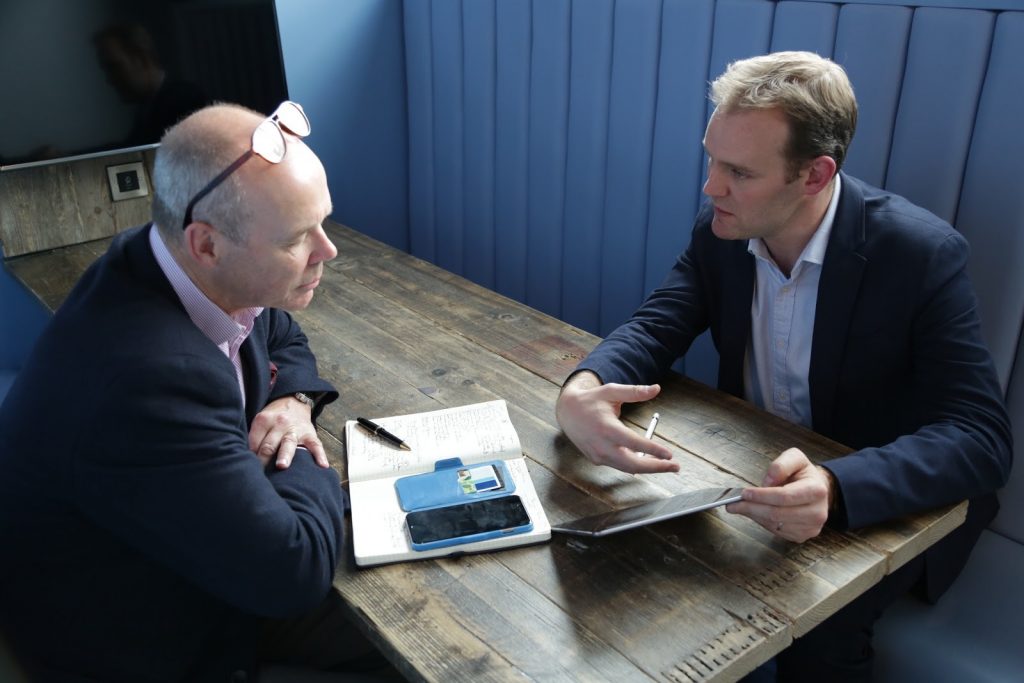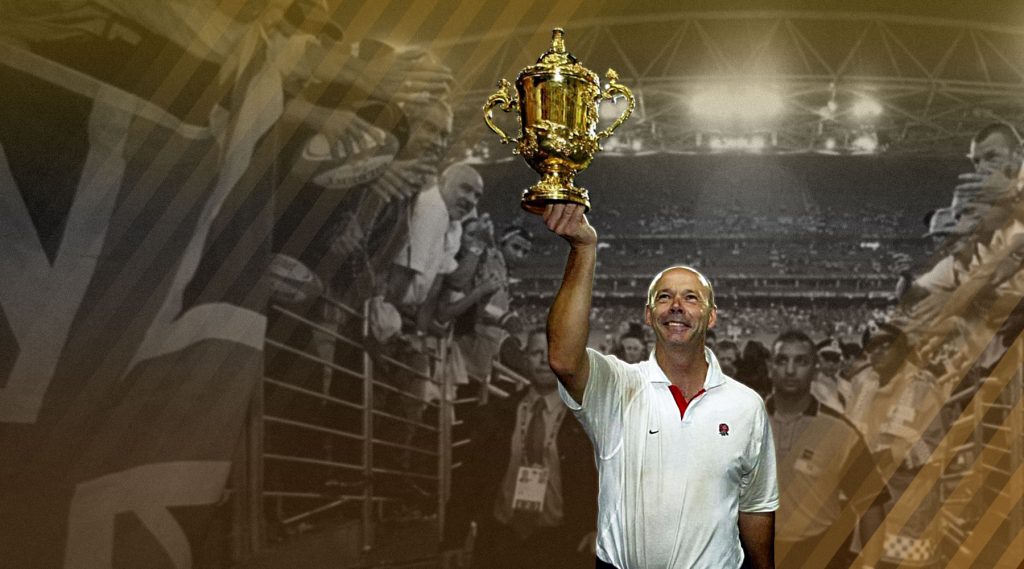Sir Clive Woodward on creating a winning culture
- 12 Min Read
Sir Clive Woodward led the England rugby team to World Cup victory back in 2003. He also helped Team GB bring home 65 medals and finish third in the Olympic Medal Table in his role as Team GB Director of Sport for London 2012.
- Author: Angus McCarey
- Date published: Jul 11, 2018
- Categories

Back in 2013, Woodward founded Hive Learning – a learning experience platform that helps organisations create high performance culture through every day learning. With England’s football World Cup hopes stronger than ever, Hive Learning CEO Angus McCarey spoke to Sir Clive Woodward about what it takes to create a winning culture in sport and in business.

You’ve helped sports teams and businesses drive high performance. With the World Cup in full swing, we’re thinking a lot about what it takes to win in sport and in business. What do you think it takes to win the World Cup?
There are four key things I look at to identify a winning team or winning coach. Talent is the first; you absolutely have to have the right people. But talent is just the starting position. You may have the talent, but it’s likely your competitors do too.
So talent alone doesn’t win – it’s what you do with the talent that matters. There are three other things that can take talent to the next level.
What every team or individual who is successful has in common is that they have the same deep knowledge and passion for their subject as the coach. They also have what I call ‘teachability’ which is the ability to learn and take on knowledge.
In a winning team, everyone must become a student and they must want to collectively improve together. If you’re in a scenario when someone says ‘You’re the coach, I’m the player – tell me what to do’, you’re in trouble. You must have a true culture of learning to win.
Understanding and absorbing knowledge is critical. But your ability to put that knowledge into practice is just as important. That’s why the ability to think correctly under pressure is essential. Pressure is everywhere – in sport and in business – so to achieve true high performance, you must be able to handle it.
Performing well under pressure doesn’t come naturally to everyone but it is something you can teach. As a leader, you can establish a set of behaviours and a way of thinking that enables your people to get comfortable with almost every pressured scenario they might encounter, and then replicate that thinking in new situations.
Lastly, your teams need to have a good attitude. Attitude can be impacted by a number of areas including background, upbringing, schooling, and more. But ultimately, everyone needs to hold themselves to a high standard – that’s something you can coach too.
So to create a winning culture, you need talent; you need teachable people; you need to learn how to handle pressure; and you have to have the right attitude. Those four things are how I coach people to achieve high performance.
Sometimes when large organisations are made up of teams who have been there a long time, some of the behaviours you describe aren’t deeply ingrained. Do you believe you can shift mindset and coach people out of negative behaviours at work?
People are either sponges or rocks. Sponges are highly teachable – they have a thirst for knowledge and they always want to be involved in what’s going on. A rock is unteachable, a bit of a know it all.
When you join a new team, you are often a sponge with a lot of enthusiasm. Often people drift into becoming rocks. Rocks are often the people who have been there the longest, who don’t think they’ve got anything more to learn. When you have a rock in your team, high performance is tough.
Your job as a manager and a leader is to keep everyone being a sponge; encourage sponge-like behaviour and set an example, as well as making sure you identify people who are becoming rocks and not contributing.

The rest of your team will spot a rock. If one person is there just going through the motions who has become lazy and complacent, the team will know. That means you’ve got to have tough conversations to address that behaviour if you’re passionate about winning.
You can coach people out of being a rock. I’ve never met anyone who comes to work saying “Right, I’m going to be a rock today, I’m going to cause mayhem”. It’s something that can just happen.
So as a leader, you have to be strong enough to sit them down and say “Right, we need you back. We need you to be the kind of person you were when you first joined this company – you were full of ideas, thoughts, passion. Let’s go back to that”.
I can’t think of anything worse than someone calling me a rock. That’s why this approach helps a lot of people. They often look back and say thank you.
What you’ve described is essentially creating a set of shared values and shared behaviours. One of the big changes you made with the England rugby team was creating a learning culture. How did you go about embedding those behaviours and getting the team to own that culture as well?
I always say there’s no such thing as a dumb idea. It’s detrimental if you’ve got an idea that you don’t share because you’re worried about ridicule or people laughing at you.
The culture of the team comes from the people. If you’re running teams of people, you know who’s inputting. You don’t want people talking for the sake of talking, but you do need people really contributing. As a leader of a team, I pride myself on not being good at new ideas but being good at listening to people and making their ideas happen.
That’s why as a leader you need to make it very clear to the whole team that the best ideas can come from the person who’s new to the company and that you value every person in the team’s opinion. That person can be learning, but they can come out with a killer idea that will absolutely make the difference in how you win.
It’s really healthy to have a culture where everyone feels totally confident about making a statement. And when you empower people to learn, research and contribute, you’re in a very powerful position. With so many ways to learn available now, there’s no excuse not to. But as a leader, you have to create and thrive in the culture.
So essentially leaders must create an environment that’s open and transparent, and actively encourage sharing and collaboration across the team. In smaller teams, that can come naturally with some coaching. You’ve coached executives in large organisations in business and huge sporting organisations like Team GB. How do you scale that sense of openness and sharing?
I have a principle I use called Teamship. Teamship is about the team discussing things, sharing ideas and being open. When you have a small team, you can often create that by meeting regularly and being together. But technology can help you scale Teamship.
What Hive Learning has done for companies is to enable teams to immediately share thoughts and ideas while getting instant feedback on what everyone else is thinking. It also gives you an opportunity to give everyone a voice across the ranks – the 18-year-old apprentice who’s just come straight from school, the CEO. Hive Learning is actually based on how I coached the England Rugby team – we digitised the process we used.
Technology also helps you see really easily who is a rock and who is a sponge. You can see who is contributing, who is really critically looking at what you’re doing – which makes a massive difference to you as a leader; it helps you identify where you need to have those difficult conversations and coach harder.
I’ve always had this saying which goes back to my Xerox days, “Whoever wins in Technology tends to win”. You can use technology to drive culture, but everyone needs to use it. The more senior you get, the more important it is to stay right on top of technology and be a sponge.
I speak to many leaders who say, “Of course I’m a sponge,” and then you talk about technology and they say, “Well, I don’t do that anymore. I’ve got all these bright young things from university doing all this sort of stuff.” In my language when you say “I want everyone else to do this. But I don’t need to”, you’ve drifted into being a rock, and that’s a mistake.
People look to leaders being involved to clear the way for them to be open. They want to know what you’re thinking, that it’s okay to share. There is a kind of ‘Grandmother effect’. If your Grandmother gives you a nod and says ‘well done’ it means quite a lot. People value this approval in a leader too and technology can help you make that very visible. It makes people feel like they’re part of something very special.
We’ve talked about the components that make up a winning culture. But day to day, what does a winning culture actually look like?
In a winning culture, everyone is always innovating – they never ever think they’ve cracked it. They’re always looking at their competitors thinking what are they doing, what are we doing, how do we do it better, what would they think about our approach, are we proud of what we’re doing?
A winning culture is having the confidence to be transparent. You should be happy to share anything you’re working on if someone new were to come into your environment. I’ve seen that in a lot of the new businesses at Blenheim Chalcot. Everybody is passionate about winning and they realise you’ve got to create a knowledge bank of sharing to try and get ahead.
The other thing I tell businesses working on creating a winning culture is that you have to work both “on” and “in” the business. In a high-performance setting, normally what I find is that everyone is working extremely hard trying to win what I call “in” the business.
But a real winning culture is defined by spending 95% of your time working “in” the business doing your day-to-day job and delivering, but also finding that 5% of your week to work “on” the business. When you’re working on the business, you take a step back and look for other thoughts, ideas and share information with colleagues.
When your whole team are spending 5% of their time working on the business – reflecting and sharing knowledge – suddenly you find you get ahead and you can’t be caught. This is a really key thing I look for in a winning culture.
I often use Mercedes Formula One as my bedrock for what a true high-performance culture looks like; they’re a hugely successful team with 1,200 people building just one or two of the best cars in the world. I like to think we had that with the England rugby team too.
It’s important to measure and benchmark performance, but sometimes we over complicate it, we have a vast amount of analytics and forget the human element. To me, sometimes it’s as simple as saying “we think we’re 6 out of 10 at the moment and we’ve got to get to 7” or sometimes you just walk into places and can almost smell the winning culture.
Mercedes Formula One is one of those places. Their attention to detail is astonishing and that detail goes across the whole organisation.
For example, when you walk into their offices the lights change during the day to give people best optimum working conditions. Every detail is geared towards driving performance which is their fundamental goal.
All these little things add up to a winning culture – it’s about doing 100 things 1% better. This is something that is so important for all companies to think about.
Any small business can be the same in their own way. You don’t need to be Mercedes, but you should have that culture across any single business. Hive Learning helps companies establish that by putting a huge emphasis on every individual in the team to contribute with a real passion for sharing information that can make you 1% better everyday.
It sounds like this comes down to codifying your culture. At Mercedes, everything is geared towards performance. One last question, now you’ve told us how to create a winning culture, do you have any final pieces of advice for actually working out what the cultural shift you need to create is?
With any team I start working with I always share with them a book called Building the Happiness Centred Business by Dr Paddi Lund.
He’s an Australian dentist, who completely transformed the way he ran his dental practice. He got pretty depressed by being a dentist because let’s face it, no one likes going to see the dentist. He realised that was impacting his performance, his staff’s performance and his customer’s perception of his whole profession.
So he decided to change the whole experience and put enjoyment, customer satisfaction, and staff satisfaction as the ultimate priorities for his dental practice. The things he needed to change were simple, but he focused.
All he did was utterly change his mindset. So I always tell people that you can do it just like this guy, you’ve just got to change your mindset a bit.
Fundamentally in every company, you need to create a passion for learning, distill your learnings and use that to execute better than anyone else.
If you have a passion for what you’re doing, then anything is possible.
For more weekly insight from Sir Clive Woodward, join Clive’s Hive and connect with 2,000 other leaders pursuing the secrets of high performance.








